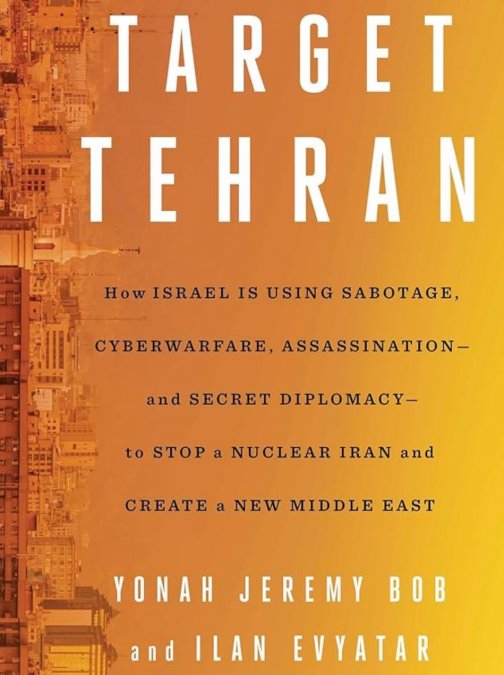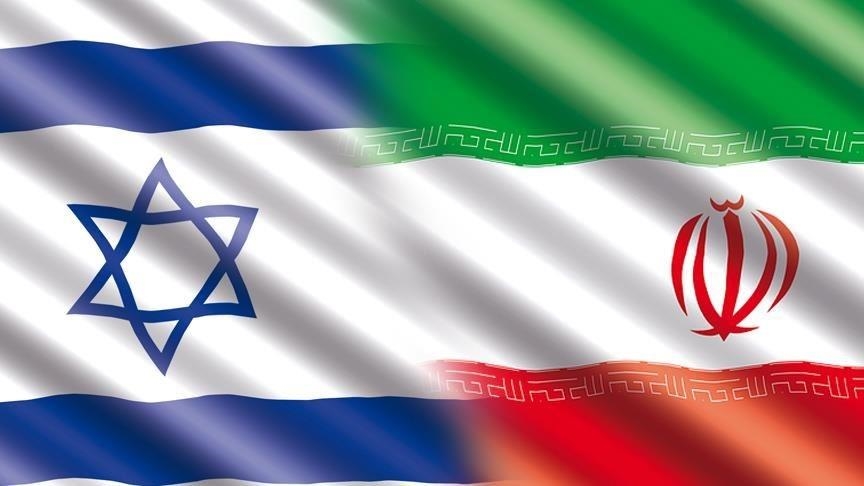Israel’s Secret Plan for Iran and the Middle East
Israel’s Secret Plan for Iran and the Middle East: The Times of Israel, on the occasion of the release of a book by Ilan Evyatar and Yonah Jeremy Bob, two senior journalists from The Jerusalem Post titled ‘Target Tehran’, delves into Israel’s covert plan to prevent a nuclear Iran and create a new Middle East using methods such as sabotage, cyber warfare, assassination, and secret diplomacy.
In their book, the two authors have interviewed spies, prime ministers, and American and Israeli officials about the covert tools used to stop what is perceived as an existential threat. This book hit the bookstore shelves in late September.
Evyatar and Jeremy Bob claim in their book that the disclosure of stolen archives in 2018 shows that Iran has been concealing its nuclear program for years, asserting that this program is not solely for civilian use. Evyatar and Bob allege that Israel’s decision to steal Iran’s nuclear archives was made two years earlier, in January 2016, by Yossi Cohen, the new head of Mossad, and Prime Minister Benjamin Netanyahu.
According to the authors, Netanyahu and Cohen wanted evidence to convince the Trump administration to withdraw from the Iran nuclear deal signed by the Obama administration in 2015. Their book documents a decades-long effort led by Mossad, which includes sabotage and assassination within Iran, to prevent the Islamic Republic from becoming a nuclear power.
As part of their research, both authors had extensive access to Cohen, who led Mossad until 2021. Cohen designed and directed many operations targeting central Tehran, including secret diplomacy that led to the Abraham Accords in September 2020.
Bob and Evyatar also had access to Meir Dagan and Tamir Pardo, former heads of Mossad, several Israeli prime ministers, many other past and present Israeli intelligence agents, and numerous American officials from the Trump and Biden administrations.
The Times of Israel contacted Evyatar and Bob in Jerusalem via Zoom to discuss their book. The details of this conversation are based solely on the authors’ claims and are naturally not endorsed by the Donyaye Eghtesad newspaper, and are published solely to reflect the Israeli adversary’s perspective on Iran.
The Times of Israel: The book begins on January 31, 2018, detailing the operation to steal thousands of documents. What kind of planning was involved in this espionage operation? Evyatar: This planning lasted two years. Mossad had precise information about these facilities. When they entered, they knew exactly which safe to steal from and how long the theft should take. They knew where the guards were until the last moment. The team had exactly six and a half hours to find a large amount of the needed documents, load them onto trucks, and escape.

The book also addresses several incidents, including the assassination of Iranian scientists and sabotage of nuclear facilities. How has Iran reacted to these Israeli attacks? Evyatar: The Iranians have tried to retaliate. For example, David Barnea, the current head of Mossad, said in early September that Israel had thwarted 27 Iranian attempts to attack Israel. There have also been attempts by Iranians to target Israeli businessmen in Cyprus.
In November 2020, Mossad assassinated Mohsen Fakhrizadeh, an Iranian nuclear scientist. Can you discuss the significance of this assassination? Evyatar: Mohsen Fakhrizadeh was one of the fathers of Iran’s nuclear program. One nuclear inspector referred to him as the Oppenheimer of Iran. Fakhrizadeh had extensive organizational knowledge of Iran’s nuclear program. After his assassination, many said this was as significant a blow as the assassination of General Qasem Soleimani.
After General Soleimani’s assassination on January 3, 2020, the Trump administration took full responsibility for it. But was Mossad involved? Did they, for example, share intelligence with the United States? Bob: It’s clear that Israel was involved in various ways. I asked Tamir Hayman, the former head of Israeli military intelligence, to tell me that Israel was heavily involved in providing intelligence that helped the United States change its stance on the assassination of General Soleimani.
In our book, we also explore the idea that Israeli intelligence provided several mobile numbers to the CIA to track General Soleimani and pinpoint his location with the precision needed for a drone strike. The issue of mobile phones was particularly important because General Soleimani changed them at least three times during the six-hour journey from Damascus to Baghdad.
We also examine the possibility that Israeli and U.S. intelligence were involved in employing individuals who worked with General Soleimani’s airline before his flight from Damascus to Baghdad.
Evyatar: The alleged Israeli assistance in the assassination of General Soleimani was not unpredictable. General Soleimani was a major enemy of Israel. His grand strategy was to create a ring of fire around Israel, mainly through supporting resistance groups in Syria, Lebanon, Iraq, and Yemen.
Another topic you explore in this book is the covert actions taken by Mossad that have helped build diplomatic trust between Israel and Gulf countries over the past few years. This ultimately led to the Abraham Accords and also made it possible to establish relations with Sudan and Morocco. However, since the October 7 attack, many things have changed. How is the Israel-Hamas war affecting Israel’s relations with the signatories of the agreement in the short to medium term? It likely presents complex issues.
Evyatar: Despite the October 7 war, the relations between Israel and the Abraham Accord countries remain intact. While the United Arab Emirates and Bahrain have publicly condemned Israel’s actions in Gaza, both Gulf countries have clarified that they will not cut ties with Israel. Several Emirati officials have publicly and explicitly stated that the Abraham Accords are here to stay. The situation in Bahrain is slightly different.
In this kingdom, the Shia majority has shown public anger, and currently, the status of relations is ambiguous with the recall of ambassadors under unclear conditions. Meanwhile, Salman bin Hamad Al Khalifa, Bahrain’s Crown Prince and Prime Minister, has publicly condemned Hamas, while Bahraini sources say the kingdom does not intend to cut ties with Israel. In the long term, it can be expected that relations between Israel and the signatories of the Abraham Accords will gradually return to normal unless a major development leads to a worsening of the Gaza war or a broader regional escalation.
Before October 7, the Biden administration was heavily working to reach an agreement where Washington would provide formal security guarantees to Saudi Arabia, and in exchange, the Saudis would establish diplomatic relations with Israel. This deal now seems very unlikely—or at least not soon. What would it take to change that? How has the Israel-Hamas war altered the potential relations between Israel and the Saudis?
Bob: Like Bahrain and the UAE, the Saudis have condemned Israel’s response to the Hamas attack, and in response to growing public anger, Crown Prince Mohammed bin Salman, who said before the October 7 attack that Saudi Arabia and Israel were getting closer every day, has now called for a ban on arms exports to Israel.
On the other hand, Saudi media, which is heavily controlled, has been moderate towards Israel and has condemned Hamas. U.S. President Joe Biden said one of Hamas’s attack goals was to eliminate the possibility of a Saudi-Israel agreement. However, while no progress can be expected for now, the White House has emphasized that the Saudis will return to normalization talks after the dust settles.
If these talks return to normal, what potential diplomatic obstacles might arise? Specifically, what will the United States offer as a carrot to bring the Saudis back to future diplomatic negotiations with Israel?
Evyatar: After the end of the war, the United States will seek to create some kind of grand agreement and bring the two-state solution back to the table. Whatever happens on that front will largely depend on when the war ends and the government that will be in power in Israel. The transfer of any amount of occupied land to the Palestinians at any foreseeable point in the future or in the medium term also deeply depends on how these issues are handled.
In your book, you write about Iran, stating that while a direct military attack is the last option, Israel has precisely prepared itself for such a possibility. Given the fact that Iran has close ties with Hamas, how close are we to such a situation today, especially after October 7? Bob: In the short term, Israel might be distracted from focusing more on Iran, but in the medium and long term, if the Islamic Republic intends to cross the nuclear threshold, Israel will likely be more prepared than ever.
In mid-November, the Financial Times published a report quoting a senior Iranian diplomat who said he did not want the Israel-Hamas war to escalate further but also warned Washington that if Israeli attacks on Gaza continue, regional conflict is inevitable. How can we interpret such dual statements?
Evyatar: As we explain in the book, Iran has mastered the art of double-speak. Facing a strong American presence in the region—and with one of its proxy assets, Hamas—Iran has no interest in direct involvement in the conflict. The more important question is whether and how Israel will strike Tehran for its unequivocal support of Hamas and its use of Hezbollah and the Houthis in Yemen to attack Israel.
Israel and Qatar do not have formal relations. How do you see the relations between Israel and Qatar in the coming weeks and months, especially since Qatar acts as a mediator between Israel and Hamas?
Bob: Qatar has currently been effective in mediating the release of some hostages. However, there are increasing voices in Israel urging Doha not to play a double game. Qatar provides significant financial and diplomatic support to Hamas, and several Hamas leaders live in Doha under Qatar’s protection. A senior Israeli Foreign Ministry official said that after the hostages are released, we will hold Qatar accountable.

